Running a B2B business in 2025 without solid SEO is like trying to drive with the lights off. You might get somewhere, but it won’t be pretty. B2B SEO presents unique challenges that consumer SEO simply doesn’t face: longer sales cycles, multiple decision-makers, and complex products that require extensive research before purchase.
The right SEO tools can mean the difference between your content languishing on page 10 of Google or attracting high-value clients who discover you through organic search. This comprehensive guide covers the most effective B2B SEO tools for 2025, from powerful free options to premium solutions that can revolutionize your entire strategy.
Whether you’re a startup founder bootstrapping your first marketing efforts or an enterprise marketing director managing complex campaigns, this guide will help you choose the perfect tools for your specific needs and budget.
What Are B2B SEO Tools?
B2B SEO tools are specialized software platforms designed to help business-to-business companies improve their search engine visibility and attract other businesses as customers. Unlike consumer-focused SEO tools, these platforms understand the unique challenges of B2B marketing.
The B2B buyer journey is fundamentally different. Decision-makers conduct extensive research, compare multiple solutions, and often involve several stakeholders before making a purchase. This process can take months or even years for high-value enterprise solutions.
Effective B2B SEO tools address these specific challenges by helping you:
- Target long-tail keywords that reflect industry-specific pain points and technical requirements
- Create authoritative content that addresses complex technical questions and builds trust
- Identify visiting companies rather than just anonymous individual users
- Integrate SEO data with CRM systems to align marketing and sales efforts
- Optimize for multiple stakeholders with different roles, concerns, and search behaviors
- Track long-term attribution from initial search to final conversion
The most effective B2B SEO tools recognize that a single organic visit might result in a six-figure deal months later. They’re designed to nurture relationships and demonstrate long-term ROI, not just drive immediate conversions.
Consider this: B2B buyers conduct an average of 12 searches before visiting a specific brand’s website. If your content isn’t appearing in those searches with helpful, authoritative information, you’re essentially invisible to your ideal customers during their critical research phase.
Must-Have Free B2B SEO Tools
Before investing in premium tools, master these free options that form the foundation of any successful B2B SEO strategy. These aren’t just adequate alternatives—they’re powerful platforms that many successful companies rely on as their primary SEO tools.
1. Google Search Console
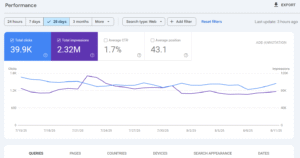
Google Search Console is your direct connection to Google’s understanding of your website. For B2B companies, this free tool provides invaluable insights into how your target audience discovers your content.
Performance Insights: Track which keywords drive clicks to your site, identify your best-performing pages, and monitor your rankings for different search terms. This data helps B2B companies understand which industry terms and pain points actually generate qualified traffic.
Technical Issue Detection: Receive alerts about indexing problems, crawl errors, and other technical issues that could prevent your content from appearing in search results. Quick identification and resolution of these issues can save thousands in lost organic traffic.
Click-Through Rate Analysis: Understand how often searchers click on your results when they appear. Low click-through rates despite good rankings often indicate that your meta descriptions need optimization.
Pro tip: Use the Performance report to identify queries where you rank on page 2 (positions 11-20). These represent your biggest opportunities for quick ranking improvements with targeted optimization efforts.
2. Google Analytics 4
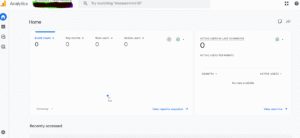
Google Analytics 4 provides deep insights into visitor behavior and conversion patterns, making it essential for understanding your B2B audience’s complex decision-making process.
Traffic Source Analysis: Identify which organic keywords and pages drive your most valuable visitors. Configure conversion tracking for key B2B actions like demo requests, whitepaper downloads, and contact form submissions.
User Journey Mapping: B2B buyers typically visit multiple pages across several sessions before converting. GA4’s enhanced measurement capabilities help you understand these complex customer journeys and identify content gaps.
Audience Segmentation: Create detailed segments based on visitor characteristics—first-time versus returning visitors, different industries, company sizes, or geographic locations. This segmentation reveals which content resonates with specific audience segments.
Conversion Attribution: Connect your SEO efforts to actual business outcomes. If organic traffic increases but qualified leads don’t, GA4 helps identify where the disconnect occurs in your conversion funnel.
3. Bing Webmaster Tools
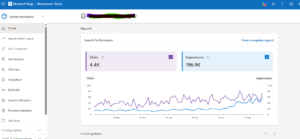
While Google dominates search, Bing Webmaster Tools deserves attention from B2B marketers. Bing powers approximately 20% of US searches, and its users tend to be older, more affluent, and more likely to hold decision-making roles in companies.
This demographic alignment makes Bing particularly valuable for B2B companies targeting enterprise clients. The platform offers:
- Alternative keyword data that sometimes reveals opportunities missed by Google Keyword Planner
- Comprehensive site crawl reports that catch technical issues from a different search engine’s perspective
- Backlink analysis tools that provide additional insights into your link profile
- SEO recommendations tailored to Bing’s ranking factors
Setup takes less than 30 minutes, and you might discover you’re already ranking well on Bing for valuable B2B terms that your competitors are ignoring.
Top Paid B2B SEO Tools (With Feature Comparisons)
Premium SEO tools can transform your B2B marketing from good to exceptional. Here’s an honest comparison of the leading options, with insights into which scenarios each tool handles best:
| Tool | Best For | Key Features | Pricing (Starting At) |
|---|---|---|---|
| Ahrefs | Backlink analysis, competitor research | Site Explorer, Keywords Explorer, Content Gap | $99/month |
| SEMrush | All-in-one marketing suite | Keyword research, rank tracking, content optimization | $129.95/month |
| Moz Pro | User-friendly SEO management | Keyword tracking, site audits, link research | $99/month |
| Screaming Frog | Technical SEO auditing | Site crawling, log file analysis, audit reports | Free / $259/year |
| Surfer SEO | Content optimization | Content editor, SERP analyzer, keyword research | $89/month |
Ahrefs

Ahrefs excels at competitive analysis and backlink research. Its Site Explorer reveals exactly which pages on competitor websites drive the most organic traffic, providing invaluable intelligence for B2B content planning. The platform’s keyword difficulty scores are particularly accurate for competitive B2B terms.
SEMrush
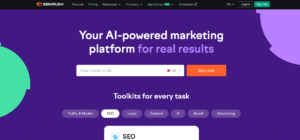
SEMrush functions as a comprehensive digital marketing platform. Beyond SEO, you get PPC research capabilities, social media tools, and content marketing features. For B2B teams managing multiple marketing channels, having everything integrated into one platform significantly improves efficiency.
Moz Pro
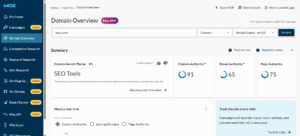
Moz Pro strikes an excellent balance between functionality and usability. The platform’s Domain Authority metric has become an industry standard, and their keyword difficulty calculations are particularly reliable for highly competitive B2B search terms.
Screaming Frog
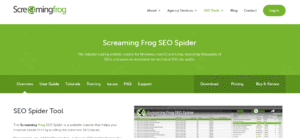
Screaming Frog specializes in technical SEO analysis. For large B2B websites with complex architectures, this tool can crawl entire sites and identify technical issues that could be impacting search performance. The log file analyzer is particularly valuable for enterprise sites.
Surfer SEO

Surfer SEO represents the new generation of AI-powered content optimization tools. For B2B companies that need to produce substantial amounts of technical content, it streamlines the optimization process by providing data-driven recommendations for content structure and keyword usage.
Emerging AI-Powered SEO Tools
Artificial intelligence is revolutionizing SEO tools, making sophisticated optimization accessible to teams without extensive technical expertise. These platforms don’t just provide data—they offer actionable recommendations and can even execute optimization tasks automatically.
1. Surfer SEO
Surfer SEO has mastered data-driven content optimization by analyzing top-ranking pages and providing specific recommendations for improvement. Instead of guessing what search engines want, Surfer gives you a detailed blueprint based on actual ranking factors.
Content Editor: Receive real-time feedback while writing, including keyword density recommendations, optimal content length, and semantic terms to include. This feature is particularly valuable for B2B writers who need to balance technical accuracy with SEO requirements.
SERP Analyzer: Understand exactly what’s working for competitors and identify content gaps you can exploit. The tool reveals the common elements among top-ranking pages for your target keywords.
Content Planner: Build comprehensive topic clusters around main B2B keywords, ensuring you cover all related topics your audience researches. This systematic approach helps establish topical authority in your industry.
Many B2B companies use Surfer to transform generic blog content into highly targeted pieces that rank on page one for competitive industry terms.
2. Frase.io
Frase focuses on understanding search intent and creating content that directly answers searcher questions. For B2B companies, this approach is particularly valuable because business buyers typically search for specific solutions to complex problems.
The platform helps you:
- Identify relevant questions your target audience asks about your products or services
- Create comprehensive content briefs that cover all important subtopics and related concepts
- Optimize existing content to better match search intent and improve rankings
- Generate FAQ sections that address common customer concerns
Frase excels at creating the type of comprehensive, question-answering content that performs well in B2B SEO, where buyers need detailed information to make informed decisions.
3. Clearscope
Clearscope specializes in semantic SEO and content relevance optimization. The platform analyzes top-ranking content for target keywords and identifies the terms, concepts, and topics you need to include to compete effectively.
For B2B content creators, Clearscope solves a common challenge: maintaining technical accuracy while optimizing for search engines. The platform helps you create content that satisfies both search algorithms and expert audiences.
Key features include:
- Semantic keyword recommendations based on top-ranking content analysis
- Content grading that scores your content’s optimization level
- Integration with popular writing tools like Google Docs and WordPress
- Team collaboration features for content review and approval workflows
4. MarketMuse
MarketMuse offers the most sophisticated approach to AI-powered content strategy. The platform creates comprehensive content plans based on topic modeling, competitive analysis, and content gap identification.
For enterprise B2B companies, MarketMuse provides:
- Comprehensive content gap analysis across your entire website
- Automated content brief generation for writing teams
- Competitive content analysis to identify opportunities
- Topic authority scoring to prioritize content creation efforts
The platform excels in complex industries where establishing topical authority is crucial for search rankings and customer trust.
Best SEO Plugins for B2B WordPress Sites
WordPress powers millions of B2B websites, and the right SEO plugins can significantly improve your search performance without requiring technical expertise or custom development.
1. Rank Math
Rank Math has quickly become the preferred choice for B2B WordPress sites due to its comprehensive feature set and user-friendly interface. The plugin offers enterprise-level functionality without overwhelming beginners.
Advanced SEO Analysis: Rank Math analyzes your content using multiple ranking factors and provides specific, actionable recommendations for improvement. The analysis goes beyond basic keyword optimization to include technical factors, readability, and user experience elements.
Schema Markup Support: Proper schema markup is crucial for B2B websites, helping search engines understand your content context. Rank Math simplifies schema implementation for products, services, FAQs, reviews, and other content types common on B2B sites.
Multiple Keyword Optimization: Unlike plugins that focus on single keyword optimization, Rank Math helps you optimize for multiple related terms simultaneously—perfect for comprehensive B2B content that needs to rank for various industry terms.
Analytics Integration: Built-in analytics show which pages perform well and which need attention, eliminating the need to constantly switch between tools.
2. Yoast SEO
Yoast SEO remains the most popular WordPress SEO plugin, with a reputation built on reliability, comprehensive documentation, and consistent updates. For B2B sites that prioritize stability and proven performance, Yoast delivers solid results.
Key advantages for B2B websites:
- Readability analysis ensures your content is accessible to decision-makers who may not be technical experts
- Snippet preview functionality shows how your pages will appear in search results
- XML sitemap generation helps search engines efficiently crawl and index your content
- Breadcrumb implementation improves site navigation and user experience
While Yoast may not offer the advanced features of newer plugins, its reliability and extensive support resources make it an excellent choice for teams that value stability over cutting-edge functionality.
3. Squirrly SEO
Squirrly SEO brings AI-powered optimization recommendations directly into your WordPress dashboard. The plugin is designed for marketers who want advanced SEO capabilities without complexity.
Notable features include:
- AI-guided optimization with step-by-step improvement recommendations
- Automated SEO tasks including image optimization and meta description generation
- Built-in performance tracking showing how optimization efforts impact rankings and traffic
- Competitor monitoring to track how your content performs against industry rivals
Squirrly works particularly well for B2B companies with limited SEO expertise but ambitious growth goals.
B2B SaaS-Specific SEO Tools
Software-as-a-Service companies face unique SEO challenges. Customer acquisition costs are high, sales cycles are long, and you’re often competing against well-established competitors with significant content marketing budgets. These specialized tools address SaaS-specific needs.
1. Leadfeeder
Leadfeeder bridges the critical gap between SEO efforts and sales results by identifying which companies visit your website through organic search. This capability transforms anonymous website traffic into actionable sales intelligence.
Company-Level Analytics: Instead of tracking individual visitors, Leadfeeder identifies the companies behind your website traffic. This information is invaluable for understanding which SEO efforts attract your ideal customers versus general browsers.
CRM Integration: Seamless integration with major CRM platforms allows your sales team to follow up with companies that have demonstrated interest through organic search behavior. Sales representatives can reference specific pages visited and content consumed during their outreach.
Behavioral Intelligence: Track which pages companies visit, how long they engage with your content, and whether they return for additional research. This data helps sales teams prioritize prospects and customize their approach.
Imagine discovering that a Fortune 500 company spent 30 minutes exploring your product comparison pages after finding you through a specific keyword search. That’s actionable intelligence that can directly impact your sales pipeline.
2. HubSpot SEO Tools
HubSpot’s SEO tools integrate seamlessly with their comprehensive inbound marketing platform, making them ideal for B2B SaaS companies that want to align SEO efforts with broader marketing and sales activities.
Unified Customer Journey Tracking: SEO data automatically connects with customer information, helping you understand which keywords and content drive the highest-value leads and customers. This integration is crucial for calculating accurate customer acquisition costs and SEO ROI.
Content Strategy Integration: Plan and execute content strategies that support your entire customer journey, from initial awareness through decision and advocacy stages.
Lead Attribution Tracking: Follow organic search visitors through your complete sales funnel and measure how SEO contributes to revenue generation.
HubSpot excels at helping you demonstrate clear ROI from SEO investments—essential for securing continued budget approval from executives focused on measurable business outcomes.
3. Demandbase
Demandbase combines account-based marketing (ABM) with SEO intelligence, creating a powerful platform for enterprise SaaS companies focused on high-value target accounts.
The platform provides:
- Intent data integration showing which target accounts are researching topics related to your solution
- Account-specific content recommendations based on company characteristics and research behavior
- Sales and marketing alignment tools that ensure both teams work from the same account intelligence
- Personalization capabilities that customize website experiences for different target accounts
For SaaS companies selling enterprise solutions with six or seven-figure deal values, this level of account-specific intelligence can significantly improve conversion rates and sales efficiency.
Technical SEO Tools for Enterprise B2B Sites
Large B2B websites often struggle with complex technical challenges that can severely impact search performance. These enterprise-grade tools are designed to handle the scale and complexity of major corporate websites.
1. DeepCrawl
DeepCrawl specializes in websites that exceed the capabilities of standard SEO tools. If you manage hundreds of thousands of pages, complex site architectures, or frequently changing content, DeepCrawl provides the sophisticated analysis capabilities you need.
Massive Scale Analysis: Crawl and analyze websites with millions of pages, providing insights that would be impossible to gather manually or with smaller tools.
Automated Change Detection: Continuous monitoring alerts you to changes that might impact SEO performance, allowing rapid response to issues before they affect rankings.
Custom Reporting Capabilities: Generate reports tailored to different stakeholders—technical teams receive detailed technical data, while executives get high-level performance summaries.
Integration Capabilities: Connect with other enterprise systems to automate issue detection and resolution workflows.
For enterprise B2B companies, preventing technical issues from impacting search visibility is often more valuable than optimizing for small ranking improvements.
2. OnCrawl
OnCrawl takes a comprehensive approach to technical SEO by combining crawl data with log file analysis, search console data, and other intelligence sources to provide complete website health insights.
AI-Driven Prioritization: Machine learning algorithms analyze patterns across multiple data sources and prioritize issues based on their potential impact on search performance.
Log File Analysis Integration: Understand exactly how search engines crawl your website and identify pages that aren’t being discovered or are being crawled inefficiently.
Performance Correlation Analysis: Identify relationships between technical factors and actual search performance, helping you focus optimization efforts where they’ll have the greatest impact.
OnCrawl excels at helping enterprise teams understand the complex relationships between technical factors and business outcomes.
3. Sitebulb
Sitebulb differentiates itself through visual analysis and clear prioritization of technical issues. Instead of overwhelming users with spreadsheets of data, it presents actionable insights through interactive visualizations.
Visual Site Architecture Mapping: Understand how your content connects and flows, identifying structural issues that might impact user experience and search engine crawling.
Prioritized Issue Management: Issues are ranked by potential impact, helping technical teams focus on problems that will deliver the greatest SEO improvements.
Executive-Friendly Reporting: Clear visualizations and summaries make it easy to communicate technical SEO value to non-technical stakeholders.
Sitebulb works particularly well for organizations that need to communicate technical SEO issues and opportunities to diverse stakeholders with varying levels of technical expertise.
Comparing B2B SEO Tools: Which Is Right for You?
Choosing the right SEO tools requires careful consideration of your specific needs, team capabilities, and business objectives. Here’s a strategic framework for making the best decisions:
Start with your primary challenge:
- Technical issues limiting performance? Prioritize tools like Screaming Frog for smaller sites or DeepCrawl for enterprise-level analysis
- Content creation and optimization? Focus on Surfer SEO for data-driven optimization or Clearscope for semantic analysis
- Limited budget but ambitious goals? Master Google’s free tools and invest in one premium tool that addresses your biggest need
- Need to prove SEO ROI? Choose tools with strong CRM integration like HubSpot or Leadfeeder
Consider your team’s expertise level: Teams with technical SEO specialists can maximize value from advanced tools like OnCrawl or Sitebulb. Marketing-focused teams might prefer user-friendly options like Moz Pro or HubSpot that provide clear recommendations without requiring deep technical knowledge.
Evaluate integration requirements: If you already use specific CRM or marketing automation platforms, prioritize SEO tools that integrate seamlessly with your existing workflow. Data silos reduce the value of otherwise excellent tools.
Match tools to your scale: A startup might achieve excellent results with Google Search Console, Google Analytics, and a WordPress plugin. Enterprise companies typically require multiple specialized tools to address their complex needs adequately.
Recommended progression: Begin with comprehensive free tools to establish baseline performance, then add one premium tool that addresses your most significant challenge. Expand your toolkit gradually as your needs evolve and budget allows.
Key Integrations for SEO + B2B Workflows
The most successful B2B SEO strategies integrate search optimization with broader marketing and sales processes. These integrations transform SEO from an isolated activity into a central component of your revenue generation system.
CRM Integration
Connecting SEO data with customer relationship management systems creates complete visibility into how organic search contributes to your sales pipeline and revenue generation.
HubSpot + Ahrefs Integration: Track complete customer journeys from initial keyword search through deal closure. Identify which keywords and content pieces drive the highest-value prospects, allowing you to focus optimization efforts on the most profitable opportunities.
SEMrush + Salesforce Integration: SEMrush’s lead generation tools integrate with Salesforce to automatically identify companies showing interest in your target keywords and add them to appropriate sales sequences.
Demandbase + Any CRM: For account-based marketing strategies, Demandbase identifies when target accounts research your solutions and triggers personalized follow-up sequences through your CRM system.
Proper attribution setup enables you to demonstrate clear ROI from SEO investments, making it much easier to secure budget approval for additional tools and initiatives.
Marketing Automation
Automation systems can respond to SEO insights without manual intervention, ensuring that optimization opportunities don’t get lost in busy schedules.
Google Analytics 4 + HubSpot Integration: Configure automated workflows that trigger when visitors from specific organic keywords take defined actions on your website. For example, visitors who find you through enterprise software searches and download whitepapers can be automatically enrolled in targeted nurture sequences.
Zapier-Powered Connections: Use Zapier to connect SEO insights with project management and communication tools:
- Automatically create project tasks when new technical SEO issues are detected
- Send team notifications when you begin ranking for important target keywords
- Add keyword opportunities to content planning systems like Airtable or Notion
These integrations ensure that SEO insights drive immediate action rather than sitting unread in reports.
International SEO Tools for Global B2B Brands
B2B companies expanding into international markets face unique challenges including language barriers, cultural differences in search behavior, and complex technical requirements for multi-language websites.
1. Weglot
Weglot simplifies international SEO for companies without dedicated translation teams or extensive technical resources. The platform handles both translation and technical SEO requirements for multi-language websites.
SEO-Optimized Translation Implementation: Weglot automatically creates properly optimized translated pages with appropriate meta tags, hreflang attributes, and URL structures that search engines can easily understand and index.
Professional Translation Integration: For critical B2B content, professional translators can review and refine automated translations, ensuring accuracy for technical terminology and industry-specific language.
Performance Tracking Across Markets: Monitor how translated pages perform in search results across different geographic markets and languages.
2. SEMrush Global Reports
SEMrush’s international capabilities help you understand search behavior variations and competitive landscapes across different markets before investing in expansion efforts.
Key capabilities include:
- Cross-country keyword analysis comparing search volume and difficulty across different markets
- Local competitor identification revealing market-specific competitors you might not know about
- Geographic ranking tracking monitoring performance in specific international markets
- Cultural search behavior insights understanding how different markets search for solutions
This intelligence is particularly valuable for B2B companies considering international expansion, as search behavior can vary significantly between markets.
3. hreflang Tags Generator
Proper hreflang implementation is essential for international SEO success, but it’s also complex and error-prone when handled manually. Hreflang generators automate this critical technical requirement.
Benefits include:
- Error-free tag generation eliminating common mistakes like missing return tags or incorrect language codes
- Scalable implementation for large B2B sites with hundreds or thousands of international page variants
- Validation tools that check existing implementations for errors
For enterprise B2B sites with complex international structures, automated hreflang generation is often the only practical approach to ensure proper implementation.
Final Thoughts
Selecting optimal SEO tools requires a strategic approach based on your company’s specific circumstances, goals, and resources.
Remember that the most effective SEO tool is one your team will use consistently. Simple tools used regularly deliver far more value than complex platforms that remain underutilized due to complexity or poor adoption.


